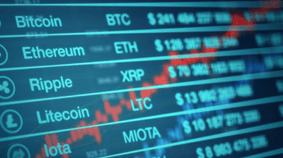If you’re a trader who wants to purchase a large amount of cryptocurrency, buying coins or tokens through a traditional exchange exposes you to several problems. Not only can slippage greatly increase the cost of a trade, but you’ll also need to deal with the risks of hacking and theft that come with trading on an ordinary exchange.
This is where over-the-counter (OTC) trading comes in. OTC trading is a service available to high-volume traders, meaning it is only available to certain individuals or groups. This guide will help you decide whether OTC trading is the right option for you, and what to look out for when deciding on an OTC solution. Let's dive in.
What is OTC trading?
OTC trading is cryptocurrency trading that takes place away from digital currency exchanges. Favoured by many large-scale traders, OTC trades are often placed by hedge funds, private wealth managers or high-net-worth individuals.
OTC trades can be facilitated in several different ways, including the following:
- Via brokers. OTC trades are increasingly handled by brokers who specialise in large transactions. These platforms offer a personalised service to help high-volume traders execute large block trades and avoid problems with slippage by accessing funds through liquidity providers that hold large amounts of cryptocurrency.
- Through chat rooms. The first major OTC trading of Bitcoin took place in an IRC chatroom called #bitcoin-otc. This trading network is hosted on various IRC channels and allows peer-to-peer transactions between traders.
- Using ATMs. Bitcoin ATMs allow customers to convert their fiat currency into digital coins without needing to go through an online exchange.
Must read: What’s a traditional exchange?
Much like stock exchanges, traditional cryptocurrency exchanges are centralised platforms where buyers and sellers can trade cryptocurrencies based on current market prices. Buy and sell offers are made publicly available on an order book. The exchange acts as the middleman between buyer and seller, and generally charges a fee for each transaction.
Some of the best-known exchanges include Binance, Coinbase and BTC Markets.
See our comprehensive list of cryptocurrency exchanges
Finder survey: How many men versus women have used a crypto exchange?
| Response | Female | Male |
|---|---|---|
| No | 77.09% | 59.35% |
| CoinSpot | 10.29% | 20.12% |
| Binance Australia | 5.44% | 10.37% |
| Swyftx | 3.3% | 8.33% |
| Coinbase | 3.11% | 7.11% |
| Other | 3.69% | 5.28% |
| eToro | 1.75% | 3.66% |
| Kraken | 0.78% | 2.64% |
| KuCoin | 0.39% | 2.24% |
| Coinstash | 1.36% | 1.42% |
| Bybit | 0.78% | 0.81% |
Why would someone use OTC trading instead of a regular exchange?
Why would you bother with OTC trading when there’s a huge variety of traditional cryptocurrency exchanges offering simple fiat-to-crypto transactions? There are several reasons why large-volume traders might consider going OTC:
- Better prices. The traditional (on-exchange) cryptocurrency market is still in its infancy, and there may not always be sufficient liquidity available on exchanges to process large trades. As a result, placing a substantial trade through a traditional exchange could move the price of a cryptocurrency in an unfavourable direction before your trade could be completed – this is known as slippage. Instead of being filled for a single price, large orders can end up being spread over several smaller orders, with the price of each order often increasing. OTC trading allows traders to access one price for a single buy order.
- Avoid low trading limits. Most traditional exchanges place a limit on the maximum amount a user can trade per day as well as on the amount that can be withdrawn from an account in a 24-hour period. These limits can also vary based on factors such as the transaction methods used, the level of account verification completed and how long a user has been trading with the platform. In many cases, they may be insufficient to meet the needs of large-scale traders.
- Quicker trading times. Depending on the liquidity available, large trades can take days to be completed on a traditional exchange. Using OTC trading can guarantee faster processing times.
- Use a trusted broker. There have been numerous examples of traditional cryptocurrency exchanges being targeted by, and all too frequently falling victim to, hacking attacks. Placing OTC trades through a trusted broker allows you to avoid this risk.
Must read: What is slippage?
Slippage is when a cryptocurrency price changes while an order is being filled, resulting in a different price than expected for a trade. It’s a common drawback associated with placing larger trades on traditional exchanges since insufficient liquidity on an exchange can lead to a single order being split into several smaller orders. Before all of those smaller orders can be filled, the price could shift in an unfavourable direction, resulting in a more expensive purchase than originally desired.
OTC trading vs trading cryptocurrency on an exchange: Pros and cons
Not sure if you’re the type of trader who could benefit from OTC trading? Check out the list of pros and cons when comparing OTC trading with buying coins on a traditional exchange to work out whether it’s right for you.
Pros
- Designed for large-scale trades, either for high-net-worth individuals or institutional traders.
- Allows you to avoid slippage, which may result in a better price.
- Avoid hacking risks associated with cryptocurrency exchanges.
- Allows you to deal with a trusted broker.
- Often offers faster settlement of large trades and quicker access to your funds than exchange-based transactions.
- Also a viable option for ICOs looking to convert cryptocurrency earned from their projects into fiat currency.
Cons
- May have higher fees than traditional exchanges.
- OTC trading can’t be automated through an API like exchange trading can.
- Only for large-scale investors (for example, $50,000 per trade or more), so not an option for small traders.
- If using a broker, you’ll need to trust the broker to thoroughly vet counterparties before trading.
- Higher level of settlement risk than traditional exchange-based trading.
- Trading directly on an exchange may be more beneficial for those who want to actively trade price movements.
How OTC transactions work
The first step in any OTC transaction is finding a counterparty for the trade. This could be done through a chat room such as the #bitcoin-otc network, but is more commonly done through an OTC brokering platform.
The next step is to negotiate the terms of the trade. If you’re looking to buy BTC, for example, you may wish to specify the following:
- The amount of BTC you want to buy
- When you want the trade to take place
- Your desired price
The seller will then respond with their offer price for the transaction, which will often be expressed as a percentage above a leading exchange’s best available price – for example, Exchange ABC + 1%. Of course, the exact negotiation process will vary depending on whether you’re the buyer or the seller, the medium you’re using to arrange the trade, the size of the transaction and whether you have any leverage.
Once a price is agreed upon, the buyer sends a bank transfer to the seller to cover the purchase price, and the seller sends the relevant amount of cryptocurrency coins or tokens to the buyer. Depending on where both parties involved in the trade reside, they may also need to complete KYC (Know Your Customer) due diligence on each other to make sure they satisfy legal requirements.
How popular is OTC trading?
Quantifying the amount of OTC trading that takes place on cryptocurrency markets is more or less impossible. This is due to the fact that these trades aren’t publicly reported or independently audited.
However, there are an increasing number of OTC brokers and platforms with public profiles, along with plenty of evidence to suggest the presence of large-scale trades.
Must read: Dark pools
Any in-depth look into OTC cryptocurrency trading raises the sinister-sounding topic of dark pools, which are designed to allow large-scale traders to transact with one another away from traditional exchanges.
Dark pools are basically private order books that are not visible to the rest of the market, allowing “whales” and institutional traders to trade anonymously. Not only does this allow them to avoid slippage caused by large trades, it also allows them to keep their trading activities confidential.
Users typically need to meet a minimum liquidity requirement to participate in these dark pools, thereby putting them out of reach of the general public.
The demand for the underground liquidity that dark pools offer is not unique to cryptocurrency markets, but the number of cryptocurrency dark pools is increasing. Cryptocurrency exchange Kraken launched a dark pool in 2015, online broker TradeZero introduced a Bitcoin dark pool in 2016 and Republic Protocol made headlines in February 2018 when its ICO raised US$30 million to create a decentralised dark pool for the atomic trading of Bitcoin, Ether and ERC20 tokens.
What features should I look for in an OTC broker?
There’s an increasing range of OTC trading desks available, so make sure to consider the following features when comparing your options:
- Transaction amounts. What are the minimum and maximum trade amounts the dealer can help you arrange? Do these fit with your trading needs?
- Fees. How much will you be charged in fees on each transaction? Is there a flat fee or does the amount vary based on the size of the trade and your personal circumstances?
- Sign-up process. What do you need to do to sign up for an account? Are there KYC/AML requirements to fulfil?
- Supported currencies. Check a list of all the cryptocurrencies the broker can help you purchase. Is it limited to major currencies like Bitcoin, Ether and Ripple, and are there any currencies missing that you’d like to acquire?
- Security and storage. How does the broker store client assets? What sort of protective measures does it have in place to ensure the security of client funds?
- Customer support. Will you receive personalised support and assistance from start to finish of the transaction? How can you get in touch with the broker if you ever have any questions or problems?
- Reputation and reviews. How long has the broker been in business? Does it specialise solely in OTC trading or does it also offer other services? How do other users rate their service?
By considering the above and other factors, you’ll be able to make a more informed decision when choosing an OTC broker.
Sources
Ask a question
More guides on Finder
-
Best exchanges for day trading cryptocurrency in Australia
We reviewed more than 20 crypto exchanges to find you the ones best suited to day trading cryptocurrency.
-
How to day trade crypto
Day trading crypto involves making short-term trades to take advantage of small price fluctuations.
-
How to short Bitcoin
Learn how you can use various short-selling strategies to further your Bitcoin profits.
-
Crypto futures trading in Australia (2025)
You can trade crypto futures in Australia, but your options may be limited.
-
Gold-backed cryptocurrencies
Compare a list of gold-backed cryptocurrencies.
-
Best crypto trading bots
Your detailed guide to cryptocurrency trading bots, how they work and the benefits and risks you need to consider when choosing a crypto trading bot.
-
How to do cryptocurrency technical analysis
There’s much to gain and lose in the volatile cryptocurrency market. If you want to make the best decisions, then you need to understand how to do a technical analysis. This guide from finder will tell you everything you need to know.
-
What is crypto arbitrage?
Learn how crypto arb trading works and how to get started with this guide.
-
Bitcoin futures trading
Find out what exactly bitcoin futures trading is, where to get started and how to pick the right trading site.



